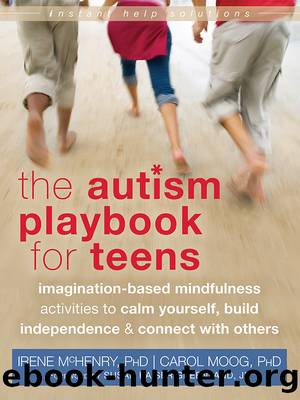Autism Playbook for Teens by Carol Moog

Author:Carol Moog [McHenry, Irene; Moog, Carol]
Language: eng
Format: epub
ISBN: 9781626250116
Publisher: New Harbinger Publications
Published: 2014-07-03T00:00:00+00:00
When you practice preventing meltdowns in the ways that you have worked on in this chapter, you are using your thoughts and feelings to build your independence. The more you practice, the stronger you will feel.
Chapter 9
your mind is the stage: get flexible and switch roles
When Ari has to go out and do something or be somewhere with other people, he feels anxious and uncomfortable, because he is very particular. He doesnât like eating certain foods, for example; if people drag him to a restaurant that doesnât have food he likes, he gets upset. He hates trying new things. People are always telling him that he needs to be more flexibleâbut he isnât even sure he knows what that means, except that he is supposed to do what somebody else wants instead of what he wants.
It is easier for Ari to just stay in his room by himself. He knows what is in there and doesnât have to deal with anybody elseâs ideas about what he should be doing. But his family doesnât understand why he spends so much time in his room. They donât realize that Ari feels best when he is alone in his room, where he feels most comfortable. Why donât they get it? he wonders.
You may find new situations stressful, even ones that are only a little different from ones you are already used to. You may feel unsure of what to do and how to behave in new situations, because you donât know what is expected of you.
Learning how to be flexible might help you feel less upset about dealing with change and more comfortable with new situations. Being flexible means being able to act differently in different situations. It does not mean changing who you are. You are always the same person, even if the situation you are in is new or different. It just means choosing to change how you act, to fit the situation.
If you have difficulty being flexible, you might not even realize when situations around you are changing. Noticing how a situation is changing is the first step in being flexible.
Being flexible means having choices. In different situations, you might discover that you donât need to change anything at all about how you would like to act. Or, you might find that making a small change, being flexible in a small way, will help you join in what other people are doing and have fun.
Being flexible isnât about saying yes to everything that everybody wants you to do. It is about being aware of what is happening in a changing situation and using your thoughts to make choices about how to act. Notice whatâs going on, notice your thoughts and feelings, and choose how to respond. That is flexibility.
In the following exercise, you will practice noticing how your thoughts are always changing. Your role in different situations changes, too. Different situations call for different roles. Your thoughts change as situations change. Noticing these changes in your own thoughts and feelings
Download
This site does not store any files on its server. We only index and link to content provided by other sites. Please contact the content providers to delete copyright contents if any and email us, we'll remove relevant links or contents immediately.
Understanding Your Parents' Divorce by Becky Lenarki(941)
This Book is Gay by Juno Dawson(698)
Welcome to Sex (Welcome To You Series) by Melissa Kang & Yumi Stynes(403)
What's the T?: The Guide to All Things Trans Andor Nonbinary by Juno Dawson(242)
Always Smile by Alice Kuipers(217)
Accountable by Dashka Slater(217)
The DBT Skills Workbook For Teens - Understand Your Emotions and Manage Anxiety, Anger, and Other Negativity To Balance Your Life For The Better by Bucket The Mentor(203)
The World Between Us by Sarah Ann Juckes(188)
No Way, They Were Gay? by Lee Wind(175)
Sex: A Book for Teens by Nikol Hasler(174)
Human Trafficking by Lita Sorensen(171)
Racism in America by Meghan Green(171)
The PTSD Survival Guide for Teens by Sheela Raja & Jaya Ashrafi(167)
Autism Playbook for Teens by Carol Moog(165)
The Fight for Disability Rights by Lisa A. Crayton(165)
The Gay Liberation Movement by Sean Heather K. McGraw(165)
Choosing to Live, Choosing to Die by Tate Nikki;Wuthrich Belle;(155)
Race Relations by Barbara Diggs(154)
Inspired to Action by Jean Rawitt(152)
